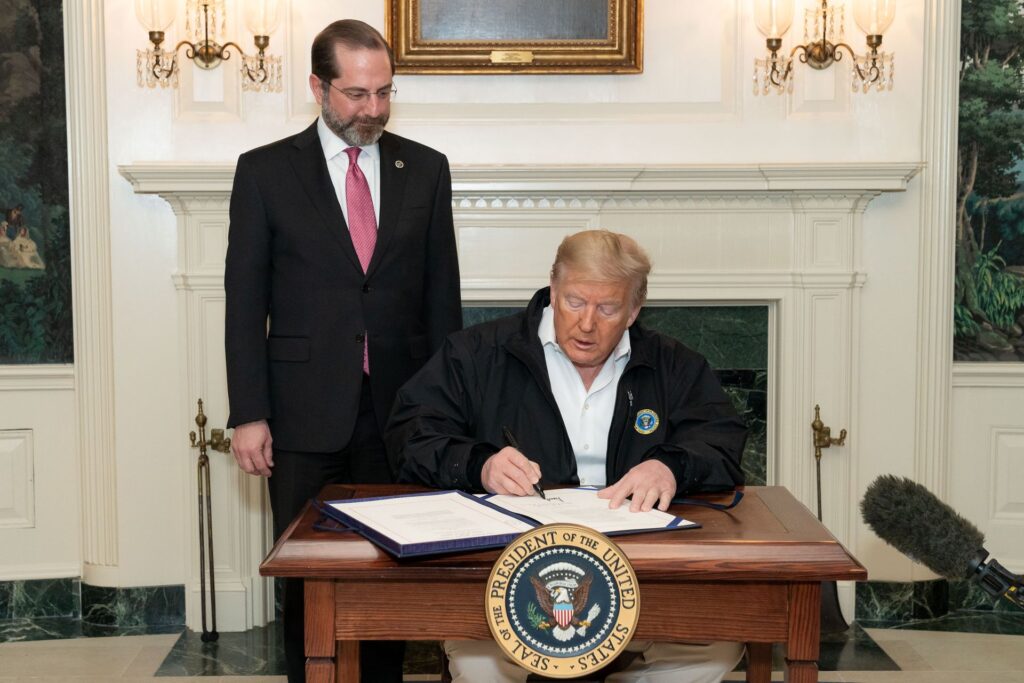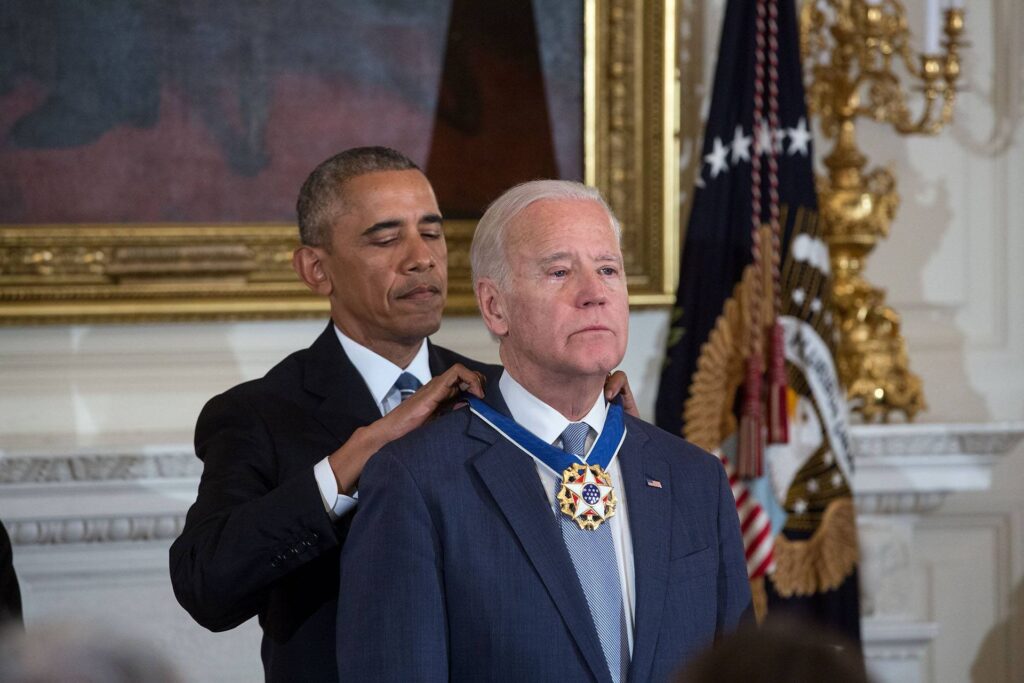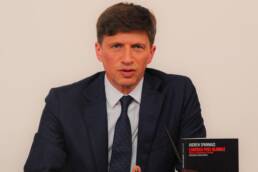Spannaus: “Biden and his people have learned the lessons of Trump”
For the political analyst, the new president will have to balance the cravings of an America steeped in ostentatious federalism with challenging China on the global stage
Andrew Spannaus is an American journalist and political analyst, best known for anticipating the populist revolt in the United States and Europe with his books “Why Trump Wins” (2016) and “The Voter Revolt” (2017).
Founder of the newsletter Transatlantico.info, he contributes to “Consortium News” and “Aspenia”, and comments on American politics for Rai News 24 and RSI (Swiss Radio and Television). He was Managing Director of the Foreign Press Association of Milan from 2018 to 2020 and is a lecturer in the Master in Economics and International Policies at ASERI, Università Cattolica del Sacro Cuore in Milan.
He recently published “L’America post-globale” (2020) a realistic analysis to understand the effects of the current crisis of globalization fueled by the coronavirus.
The assault on the Capitol shocked the world and made evident a split in American society. What are the main historical roots of this rift?
“The assault on the Capitol shows in an extreme way the socioeconomic rift that divides the United States. Urbanized societies on the coasts have developed a very different standard of living from the less urbanized, more rural and de-industrialized parts of America, which experience deep economic hardship. These have felt cut off from progress and the globalized economy permeated by finance, with severe social consequences. Suicides, drug use, social and psychological difficulties, the sense of exclusion of those who see politics as culpably disinterested in those who are left behind have increased. This feeds a cultural divide as well. The less urbanized areas have maintained a conservatism of values that is contrasted with the multiculturalism and excess of political correctness of the coasts and big cities. While the country remains ideally united in terms of its historical base, this unity does not translate into a shared current political vision. Trump’s four years have been a wake-up call for American institutions, now increasingly aware that they cannot continue to ignore the rallying cry of so-called deep America. Biden knows this. That’s why, as soon as he was appointed, he issued an executive order to privilege American industries and facilitate the return to the United States of production sectors that had been relocated. This is an unavoidable realization after the rise of populism, which has shown that the social problems created by globalization can quickly translate into national security problems, both because of internal divisions and the weakening of the American role in the world.”

Does the U.S. federal system fuel this social divide? Or can it provide solutions to overcome it?
“The federal division leaves many powers to the individual states to which it allows to strengthen their own particular identity with respect to that of the whole nation. This translates into a great plurality of cultural views and economic dynamism. In fact, it is possible to govern on the basis of the different needs and social structures that exist within a space as vast as the American one. States have different laws on abortion and the death penalty, taxes, unions and schools. This is an element of strength because it makes cultural homogenization more difficult in favor of the preservation of different traditions and cultures and allows a strong involvement in democratic life at the local level. In each county, for example, there is a vote for the school board. The problem is when reactionary elements strengthen within these strong autonomies. Voting laws, for example, differ from state to state, with Democrats generally encouraging people to go to the polls while Republicans often do the opposite, out of pure political self-interest. An anti-national view remains in some Southern states, and local governments must be forced by the courts to grant African Americans the right to vote. Then, when Obama tried to expand health care to the poor, many states refused to do so because they believe that it is an interference in their own affairs and in this case the courts gave them reason. In such contexts, an extreme form of federalism is proposed, called the battle over ‘States rights’, according to which any matter that is not strictly a matter of national interest, therefore especially security and foreign policy, should be left to the States”.
Switzerland and the “fantastic four” of direct democracy
The ethics of competitiveness and the spirit of federalism
Waldstätte and the “forest” cantons at the dawn of Switzerland…
The storming of the Capitol and before that the demonstrations following the murder of George Floyd made the world aware of the existence of armed groups in America. Are they strongly locally rooted realities that therefore benefit from the decentralization of power?
“These groups are not new, they were already there in the 1990s. They are generally rooted on some territories where they contest to exasperation the too much federal power. They don’t cite Karl Marx or Julius Evola but appeal to freedom or the American Constitution. It may be that these armed militias are tolerated at the local level by the public force, which perhaps shares with them an idea of greater local autonomy. However, it must be stressed that the complicity of law enforcement is minimal. They are very small in numbers, but can do great damage. They tend to grow stronger in periods when there is a Democratic president pushing for more federal intervention at the expense of local autonomy. Trump has exploited this sentiment by questioning the integrity of the state. His real responsibility with respect to Jan. 6 is to have undermined the basic element: trust in the integrity of institutions by saying the election was stolen without any hard evidence.”
Trump also lost the election because he was accused of failing to manage the VOCID19 outbreak. To what extent has centralized management of the outbreak been lacking? To what extent, however, did the federal structure help?
“U.S. states had important roles in managing the pandemic, granted by the freedom afforded by the federal system. The more conservative states implemented fewer restrictions, then paid for the levity. Those that have been less ideological in managing the crisis have generally had more satisfactory results. On the one hand, it can be said that Trump has failed to develop an effective national health plan. On the other hand, however, it must be recognized that centralized management would have led to other problems related to standardized measures. This would, for example, have done damage to the school system and the economic system in areas that had very few infections.”
The Europe of small states and a barely sketched federalism…
The brochure “The Confederation in Brief” 2021 is available for downloading
swisstopo digital geodata available free of charge
So what should we expect from the international image crisis of the United States reinforced by the assault on Capitol Hill? Can this translate into a diminished American grip on the world and thus to a decentralization of power within the globalized world?
“There is no question that the image of American superiority has been hit hard by internal strife, the failure to respond to the virus, and the assault on Capitol Hill. So now the United States must offer a global response to the consequences of the virus in order to revive the American role in the world. The economic response has already been massive, with vaccine development in record time. This, however, may not be enough. The pandemic fits into a pre-existing situation of American course correction in response to the rise of China, whose competition requires the United States to rediscover the strengths of its own system to use as an aggregator for its allies and thus keep them away from the Chinese model. This passes in the strengthening of the idea of democracy. Today we talk about technological democracy, that is, developing our own technology to make available for the diffusion of our liberal values. Then the American economic base becomes more and more important”.

Which Biden has said he wants to deal with, as you mentioned earlier….
“Yes, because this is not only a question of domestic policy but also of geopolitical projection of the United States in the world. In order to spread the values of Western civilization, you have to prove that they are leading a functioning society. We have seen that American appeal is not sustainable if bombs are used to export democracy. In order to have a leading role, it is necessary to go back to ensuring the welfare of the middle class and to correct the strategic errors that led to inequality. I am talking about the mistakes made in the destabilization of the Middle East, the failure of development policies in Africa and Latin America that conceal an imperial attitude”.
The Presidency of the Helvetic Confederation from 1848 to today
Swiss monuments? A “hidden” treasure to be enhanced…
Athenian democracy? Revive between Glarus and Appenzell…
We must therefore expect that in order to protect the middle class it is necessary to make economic production more locally rooted and therefore to some extent less globalized…
“I wrote a book on this subject. Globalization since the 1990s has increased the power of finance and has privileged short-term investments, thinking of relegating production elsewhere. This has damaged the entire social and economic structure and generated the problems that Trump has ridden on. Most of American politics has now recognized that this model must change, in order to relaunch in the world both the idea of the American Way of Life and that of the stability of American democracy. Which, however, has never been questioned, even if it has had to withstand a difficult situation with a president like Trump who first forced institutions to reflect, but then also threatened the legitimacy of the institutions themselves, something for which he has never had any support within the state apparatus.”







